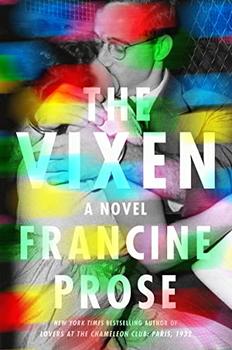Summary | Excerpt | Reviews | Beyond the Book | Readalikes | Genres & Themes | Author Bio

Running through the thirteenth-century saga is a long and vicious dispute between Njal and a man named Flosi. This kinsman kills that kinsman; one soldier kills another. Each death is payback, brutal death repaid by brutal death. Under attack, Njal takes refuge with his clan, in the family longhouse. Flosi's men surround them. They let the women and children go, but when one of Njal's sons tries to sneak out, disguised as a woman, he is recognized and beheaded. Flosi's men set the building on fire. Eleven people die. Near the end, Njal's surviving son kills a man for mocking his brother's failed escape.
I wrote about revenge. I had to. Crowley was on my committee. I wrote about truth and honor, about masculinity, and how even sworn enemies knew that it was evil to slander the innocent dead. I had a scholar's curiosity, a deep love for my subject. I loved research. I loved the way that one text led me to another, the way that each book suggested the next I needed to read.
After my thesis was accepted with high honors, I passed Crowley in the hall, and he said, "Congratulations."
Later I went to see him after I'd been rejected by the University of Chicago. I thought he might know why. I knew it was pathetic to ask, but I couldn't help it.
He seemed not to remember me. He nodded as he listened to my story, which took two sentences to tell.
He said, "I'm sorry. Good luck."
* * *
Back home that summer, I slept a lot. My parents said: He's catching up on sleep. He worked so hard for four years. I liked napping on the love seat with the television on. I woke to the strident voice of a Belgian chef teaching American housewives how to prepare frangipane tarts and veal stews, dishes that, she clearly believed, American women were incapable of making. During the commercial breaks, my mother sighed so theatrically that I couldn't pretend to nap. The advertisements were her signal to say, Cheer up, Simon, have patience. There's so much to live for. Life is full of surprises.
It would have been cruel to point out that not all surprises were good. Last year—surprise!—Mom's migraines had forced her to quit teaching. Now she spent her days on the couch, an ice pack on her forehead. Once, during an ad for a bathtub cleanser, she said, "Simon, your mother predicts: Everything you learned in college will come in handy. Your life will get better and better." Across the room, cartoon soap bubbles costumed as Vikings chanted a threatening baritone jingle as they swirled down the drain.
My mother said, "You know so much about the Vikings. Maybe they could use someone like you in the advertising business."
I longed to share her faith, her sweet optimism. I got up and left the house.
* * *
The only time I felt awake was during my daily walk to Coney Island. I craved the noise, the crowds, the salt air, the sideshows on the midway.
Rain or shine, I stood in line to ride the Cyclone with the giggling couples looking for an excuse to grope each other, the kids gearing up to cry and vomit. As the train chugged up the incline, I felt the husk of my life drop back to earth, like the stages of a rocket. After that first plunge, all that remained was the bright kernel of soul—authentic, pure, fully alive—exploding inside my head. I wanted to feel my hair blown back, my skin stretched over my bones. I wanted to think I might die, that death might solve my problems. I wanted to feel my brain pressed against my skull. Mostly, I wanted to feel grateful and happy to be alive when the train leveled and slowed. The Cyclone was my prayer, my meditation.
In July my father timidly suggested that he could find me a job at the sporting goods store. My mother and I wheeled on him, horrified by the thought of me spending my life comparing tennis rackets. Our distress made my father seem to shrink, and I too felt smaller, reduced by my own ingratitude. I wanted my father normal-sized again. I wanted him to know that my love and respect for him didn't mean that I wanted to work where he worked.
Excerpted from The Vixen by Francine Prose. Copyright © 2021 by Francine Prose. Excerpted by permission of Harper. All rights reserved. No part of this excerpt may be reproduced or reprinted without permission in writing from the publisher.



No matter how cynical you get, it is impossible to keep up
Click Here to find out who said this, as well as discovering other famous literary quotes!
Your guide toexceptional books
BookBrowse seeks out and recommends the best in contemporary fiction and nonfiction—books that not only engage and entertain but also deepen our understanding of ourselves and the world around us.